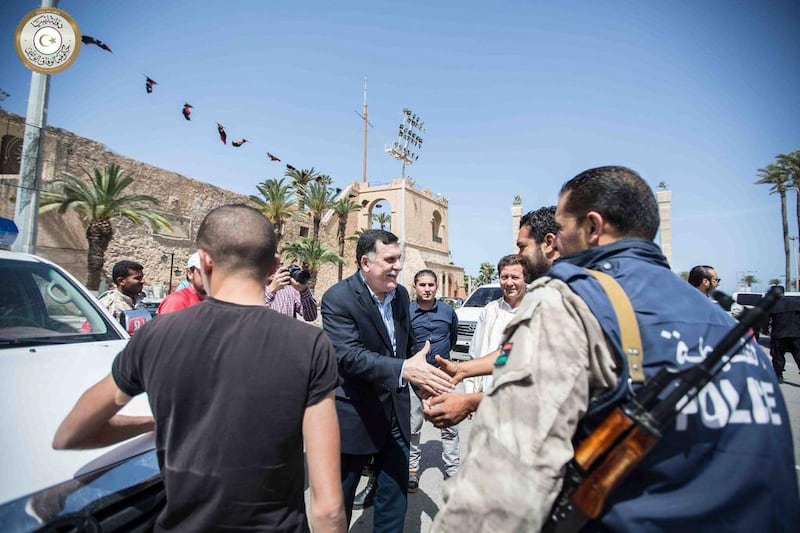TRIPOLI // Libya’s UN-backed unity government has won increasing pledges of loyalty as it gradually exerts its authority in the face of strong opposition from rival political forces in the conflict-wracked country.
Libya’s warring sides are under intense international pressure to cede power to prime minister-designate Fayez Serraj, whose arrival in the capital on Wednesday angered the militia-backed authority that controls Tripoli.
But there are signs that allegiances are starting to shift in favour of Mr Serraj, a businessman from the capital who was a member of a committee that paved the way to national dialogue in Libya.
Ten western cities called on all Libyans to back the Government of National Accord (GNA) on Thursday in a major blow to the Tripoli authority which is refusing to give up power.
The announcement was made on the official Facebook page of the Sabratha municipality near the border with Tunisia.
“The situation of the country is sad. Life is very expensive, there is no cash, and so we saw that it’s time to support this government in order to start solving all of these issues,” said Sabratha mayor Hussein Al Dawadi.
Oil-rich Libya was plunged into turmoil after the 2011 ouster and killing of longtime dictator Muammar Qaddafi.
Two rival governments have been vying for control since mid-2014 when the Libya Dawn militia alliance overran Tripoli, forcing the internationally recognised parliament to flee to the country’s remote east.
The militia-backed Tripoli administration demanded that Mr Serraj leave or surrender following his arrival by sea on Wednesday with a naval escort. The administration had earlier closed its airspace to Mr Serraj to prevent him from flying into the capital.
But despite these demands, the UN-backed leader remained in Tripoli on Friday where he is slowly building a power base.
On Thursday he met with the head of Libya’s Tripoli-based central bank and discussed measures to safeguard banks and tackle the country’s “cash flow problem,”, according to Mr Serraj’s office.
Perhaps crucially, however, the unity government now has the support of the main armed group in the capital, Nawasi, signalling a split within the security forces once loyal to the Tripoli authority.
“This is the bandwagon effect that many were hoping for,” said Mattia Toaldo, a policy fellow at the European Council on Foreign Relations.
The unity leaders and their backers “have managed to convince a great part of what used to be Libya Dawn to join the GNA”, he said.
“Difficult times lie ahead. The immediate challenge is to end the cash crisis. For the moment though the GNA seems to have proved that it’s the only realistic game in town.”
Around 300 supporters of the unity government gathered in the centre of Tripoli on Thursday, waving banners and flags.
World powers are increasingly alarmed about the rise of ISIL in Libya, located just 300 kilometres away from Europe.
The extremists have established a stronghold in Qaddafi’s coastal hometown of Sirte and launched a wave of attacks, both against rival Libyan forces and across the border in Tunisia.
The country has also long been a stepping stone for refugees seeking to cross the Mediterranean, and in recent years traffickers have exploited the country’s instability.
International leaders, eager to see the establishment of a credible Libyan partner in efforts to tackle the extremists and people-smugglers, have pleaded with Libya’s warring sides to endorse the unity government.
EU member states on Thursday agreed to impose sanctions on three Libyans for obstructing the formation of Mr Serraj’s government.
They are the speaker of Libya’s internationally recognised parliament, Aguila Saleh, as well as the Tripoli-based prime minister Khalifa Ghweil and parliament chief Nuri Abu Sahmein.
The measures comprise “a ban on travelling in the European Union and a freeze on assets in the EU”, a European source said.
French foreign minister Jean-Marc Ayrault on Friday urged the international community to prepare to help the unity government if asked, including providing military support if necessary.
“The chaos which reigns there today aids the rapid development of terrorism. It is a direct threat to the region and to Europe,” he said in comments to a French newspaper.
* Agence France-Presse





